| Srl | Item |
| 1 |
ID:
117990
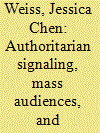

|
|
|
|
|
| Publication |
2013.
|
| Summary/Abstract |
How can authoritarian states credibly signal their intentions in international crises? Nationalist, antiforeign protests are one mechanism by which authoritarian leaders can visibly demonstrate their domestic vulnerability. Because protests in authoritarian states are risky and costly to repress, the decision to allow or stifle popular mobilization is informative. The threat of instability demonstrates resolve, and the cost of concession increases the credibility of a tough stance. The danger of instability and escalation increases foreign incentives to make concessions and preserve the status quo. This logic helps explain the pattern of authoritarian tolerance and repression toward nationalist protest. A case study of two U.S.-China crises shows how China's management of anti-American protests affected U.S. beliefs about Chinese resolve.
|
|
|
|
|
|
|
|
|
|
|
|
|
|
|
|
| 2 |
ID:
138436
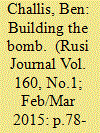

|
|
|
|
|
| Summary/Abstract |
The assumption underlying much of the debate about nuclear proliferation is that future proliferation threats emanate primarily from states outside the democratic community. In this winning essay of the Trench Gascoigne competition 2014, Ben Challis argues that this assumption is mistaken. Instead, he points to a number of common characteristics among authoritarian states that hinder their ability to pursue nuclear weapons, providing more flexibility and time in which the international community can respond. In contrast, many democratic states have the capacity to build nuclear weapons quickly and face growing incentives to do so – suggesting a reassessment of counter-proliferation efforts is required.
|
|
|
|
|
|
|
|
|
|
|
|
|
|
|
|
| 3 |
ID:
098231
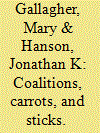

|
|
|
| 4 |
ID:
118985
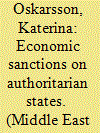

|
|
|
| 5 |
ID:
110109
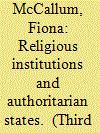

|
|
|
|
|
| Publication |
2012.
|
| Summary/Abstract |
The churches in the Middle East are generally perceived to be supportive of the authoritarian states in the region. The motivations for this strategy and its successes and limitations in the context of the authoritarian environment and the religious heritage of the region are explored. The article argues that the approaches pursued are determined by the structure of the community in relation to the majority and other Christian communities as well as by state policies towards the community. The overriding aim of church leaders of protecting their communities has led to a modern variation of the historical millet system, which provides them public status in exchange for their acquiescence in regime policies. This security guarantee, combined with wariness towards other potential political actors and the desire to protect their privileged position from communal challengers, has resulted in the hierarchies' preference for the authoritarian status quo rather than encouraging democracy promotion.
|
|
|
|
|
|
|
|
|
|
|
|
|
|
|
|
| 6 |
ID:
197723


|
|
|
|
|
| Summary/Abstract |
This article seeks to understand Russia's influence and foreign policy in the Indo-Pacific region and argues that Russia has been slowly reestablishing its presence in various ways and predicts that it will continue to do so despite limited resources and its lackluster performance in Ukraine. The pivot to Asia for Russia is more important in the wake of the war against Ukraine, and it must be seen in the context of Russia's interest in confronting US power amid a crisis of the liberal international order. Russian foreign policy has not factored much into the deliberations of US strategists when they considered the Indo-Pacific region recently. US policymakers will need to pay more attention to Russia going forward because the Ukraine war is bringing Russia and China closer together. Given Russia's increasing reliance on China to help circumvent the impact of sanctions against Russia and to help counter its isolation from the West, the two powers are likely to collaborate further in the future. China's reliance on Russia as its junior partner in the region benefits both in countering US influence.
|
|
|
|
|
|
|
|
|
|
|
|
|
|
|
|